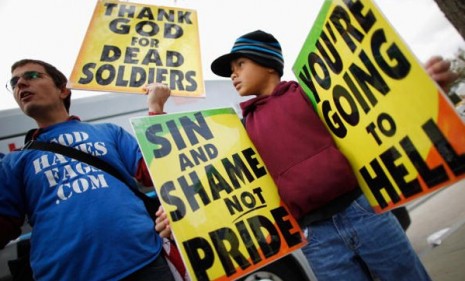Westboro Baptist Church wins Supreme Court ruling: The right decision?
The highest court in the land rules that the strategically offensive anti-gay protests by Fred Phelps' church are protected by the First Amendment

A free daily email with the biggest news stories of the day – and the best features from TheWeek.com
You are now subscribed
Your newsletter sign-up was successful
The Supreme Court has ruled that the First Amendment protects the Westboro Baptist Church's controversial protests of military funerals. In an 8-1 decision, the court said that the church, led by pastor Fred Phelps, was exercising its freedom of speech in displaying signs reading "Thank God for Dead Soldiers" and "Fags Doom Nations" at the funeral of Marine Lance Corporal Matthew Snyder. (The Kansas-based church preaches that the U.S. war dead are God's punishment for America's tolerance of homosexuality.) The case was filed by Snyder's father Albert, who won over $10 million damages against the church in 2008 in a Maryland district court for "emotional distress, intrusion upon seclusion, and civil conspiracy." The Court of Appeals overturned that decision, and now the Supreme Court has agreed. Did it make the right decision? (Watch a Fox News report about the decision)
Yes. That's the price of having free speech: No matter how "loathsome" the Westboro Baptist Church may be, says Alana Goodman at Commentary, "the court's decision is correct." The "universally despised" group is better opposed by counter-protests or picketing laws, not by ignoring the constitution. "The price of free speech is that we have to put up with the worst of it."
"Supreme Court rules in favor of Westboro Baptist Church"
The Week
Escape your echo chamber. Get the facts behind the news, plus analysis from multiple perspectives.

Sign up for The Week's Free Newsletters
From our morning news briefing to a weekly Good News Newsletter, get the best of The Week delivered directly to your inbox.
From our morning news briefing to a weekly Good News Newsletter, get the best of The Week delivered directly to your inbox.
No. When words are used to hurt, we shouldn't protect them: The First Amendment should not be used to justify the "vicious verbal assault that occurred in this case," says Justice Samuel Alito in his citation of dissent. In fact, the Supreme Court has ruled before that words can, "by their very utterance, inflict injury." That is clearly what happened to Lance Corporal Snyder's family. The First Amendment was not designed to uphold this type of "malevolent verbal attack."
"ALBERT SNYDER, PETITIONER v. FRED W. PHELPS, SR., ET AL"
We can't equate words with violence: Alito's "surprisingly touchy-feely" citation goes too far, says Tim Cavanaugh at Reason. Being attacked by nasty words is not the same as a physical attack — you can ignore one, but not the other. And, as Alito's colleague Chief Justice John Roberts wrote, Westboro's protests did not single out Snyder's family but were "general in nature." Calling it a personal assault "seems like a stretch to me."
"What speech would be free in Alitopia?"
A free daily email with the biggest news stories of the day – and the best features from TheWeek.com
The Court should have ruled on 'buffer zones': Chief Justice Roberts suggested that creating "buffer zones" might be a better way to legislate against offensive protests, points out Doug Mataconis at Outside the Beltway. But isn't that just another way to silence free speech? Imposing "time, place, and manner regulations" have First Amendment implications, too. "The Courts need to address these issues, and they need to do so carefully."
"Supreme Court: Westboro Baptist Church funeral protests are protected speech"
-
 What are the best investments for beginners?
What are the best investments for beginners?The Explainer Stocks and ETFs and bonds, oh my
-
 What to know before filing your own taxes for the first time
What to know before filing your own taxes for the first timethe explainer Tackle this financial milestone with confidence
-
 The biggest box office flops of the 21st century
The biggest box office flops of the 21st centuryin depth Unnecessary remakes and turgid, expensive CGI-fests highlight this list of these most notorious box-office losers
-
 The billionaires’ wealth tax: a catastrophe for California?
The billionaires’ wealth tax: a catastrophe for California?Talking Point Peter Thiel and Larry Page preparing to change state residency
-
 Bari Weiss’ ‘60 Minutes’ scandal is about more than one report
Bari Weiss’ ‘60 Minutes’ scandal is about more than one reportIN THE SPOTLIGHT By blocking an approved segment on a controversial prison holding US deportees in El Salvador, the editor-in-chief of CBS News has become the main story
-
 Has Zohran Mamdani shown the Democrats how to win again?
Has Zohran Mamdani shown the Democrats how to win again?Today’s Big Question New York City mayoral election touted as victory for left-wing populists but moderate centrist wins elsewhere present more complex path for Democratic Party
-
 Millions turn out for anti-Trump ‘No Kings’ rallies
Millions turn out for anti-Trump ‘No Kings’ ralliesSpeed Read An estimated 7 million people participated, 2 million more than at the first ‘No Kings’ protest in June
-
 Ghislaine Maxwell: angling for a Trump pardon
Ghislaine Maxwell: angling for a Trump pardonTalking Point Convicted sex trafficker's testimony could shed new light on president's links to Jeffrey Epstein
-
 The last words and final moments of 40 presidents
The last words and final moments of 40 presidentsThe Explainer Some are eloquent quotes worthy of the holders of the highest office in the nation, and others... aren't
-
 The JFK files: the truth at last?
The JFK files: the truth at last?In The Spotlight More than 64,000 previously classified documents relating the 1963 assassination of John F. Kennedy have been released by the Trump administration
-
 'Seriously, not literally': how should the world take Donald Trump?
'Seriously, not literally': how should the world take Donald Trump?Today's big question White House rhetoric and reality look likely to become increasingly blurred